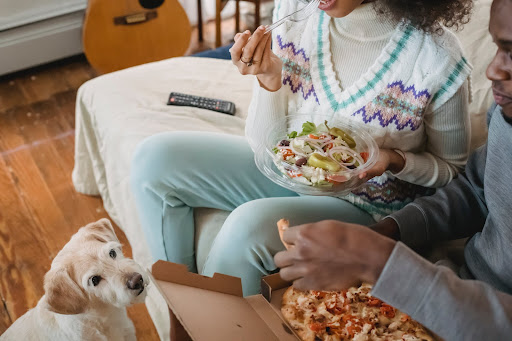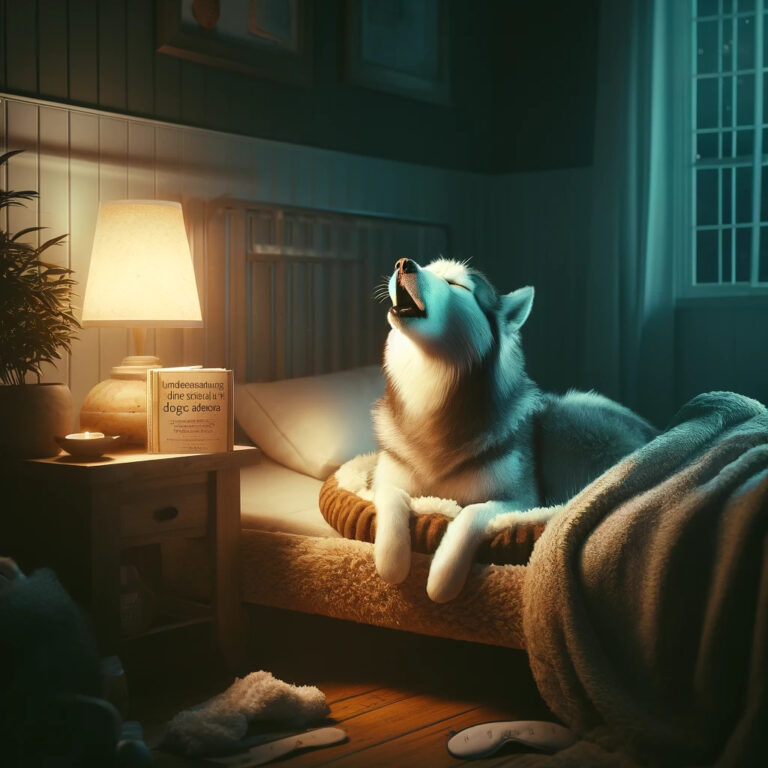Ever wondered why dogs look away when you eat? Learn the intriguing reasons behind this common canine behavior to know if it’s natural or if you need to consult a vet.
Ever wondered why dogs look away when you eat? Learn the intriguing reasons behind this common canine behavior to know if it’s natural or if you need to consult a vet.
Have you ever caught your dog’s gaze as you bite into a juicy steak, only to have them suddenly look away? While it may seem like a simple quirk of your pet’s personality, the reasons behind this behavior are deeply rooted in the complex language of dog psychology. The answer is quite straightforward and simple if you have the same query as most of our patient vet owners: why do dogs look away when you eat?
Dogs often look away when you eat primarily because of their evolutionary instincts and social cues. It’s a way of showing submission and avoiding conflict, as direct eye contact is seen as a challenge for them. So, when your dog looks away during your mealtime, it’s their way of maintaining a peaceful coexistence.
However, not all dogs are the same and so is the reason. Continue reading to uncover the other reasons why dogs avert their eyes during your meals and learn how to interpret these subtle cues, enhancing your relationship with your dog and ensuring meal times are comfortable for everyone involved
Is It Normal For All Dogs To Look Away When You Eat?
Yes, it’s normal for dogs to look away when you eat. This behavior is a sign of respect, acknowledging you as the pack leader. It’s a natural instinct for dogs to show this kind of submission, indicating a healthy and respectful relationship with their human owners.
However, it’s important to note that not all dogs exhibit the same behavior. Some dogs may be more confident and maintain eye contact, while others may be more submissive and look away.
Understanding your specific dog’s behavior is essential. By knowing your pet’s individual tendencies, you can create a harmonious mealtime environment that suits their personality
Understanding Dog’s Meal Time Gaze
The behavior of dogs looking away when you eat may be a result of their innate nature or adaptation after any particular experience. Thanks to our years of experience, we have listed down all the possible factors that can contribute to your pet looking away when you eat.
1. Respect for Hierarchy
In both wild canine packs and domestic settings, a clear social hierarchy is crucial for harmonious interactions among members. This hierarchy, often observed in dogs, extends to their interactions with humans, particularly in a home environment.
One notable behavior is the avoidance of direct eye contact during human meal times. This action is more than a mere habit; it’s a sign of respect and submission within the pack dynamic. When your dog looks away as you eat, it’s not just a random act. Instead, it’s a recognition of your role as the leader and provider.
This is a common and natural behavior, indicating a well-adjusted and respectful relationship between you and your pet.
2. The Evolutionary Instinct
Dogs share a lineage with wolves and many of their behaviors are inherited from this lineage. Mealtime behaviors are crucial for them for their survival. In the wild, making eye contact with a dominant pack member during eating could be seen as a challenge.
In the wild, maintaining prolonged eye contact with another dog can be seen as a challenge and this behavior may lead to confrontations. Dogs may look away from their human owners during meals as a submissive gesture and not disrespect, believing it’s the ‘pack leader’s’ right to eat first.
3. Try To Avoid Begging
According to WebMD, begging is a natural behavior for dogs but there are certain steps that can help dog owners to train their pets to avoid begging.
They instinctively understand that begging for food is discouraged. So they avoid any intentional eye contact that may signal their desire for a bite.
Over time, they’ve picked up on the fact that begging for food is generally not appreciated by their human pack members. By looking away they demonstrate their understanding of these social dynamics and aim to be well-mannered.
4. Reward and Training
Dogs are quick learners, and their behavior is often shaped by their past experiences. According to a study. if your dog has a history of receiving rewards or punishments based on their actions during your meals, it can significantly impact their behavior.
For instance, if your dog was previously rewarded with scraps of food when they gazed at you while you ate, they may have learned that this behavior is fruitful, leading them to continue doing it.
On the flip side, dogs are also sensitive to negative consequences. If a dog has faced punishment, such as scolding or being shooed away, when they tried to beg for food, they may have learned to look away to avoid these unpleasant experiences.
5. Respect Your Boundaries
Dogs, much like humans, have a sense of personal space and boundaries. During mealtime, they may look away to respect the space around your plate and avoid intruding on your eating area.
This behavior demonstrates their understanding of the need to maintain a certain distance and not be intrusive to your meal. You may also perceive it as their way to show consideration for your dining space and to avoid potential reprimand, they may choose to look away.
6. Training and Sensitivity to Human Cues
Dog owners often train their pets to exhibit polite behavior around the dinner table, which includes not staring or begging for food.
According to a study, dogs are highly attuned to understand human body language and cues. They may sense or feel when their human counterparts prefer not to be disturbed while eating. In response to these subtle signals, dogs naturally choose to look away to comply with these unspoken wishes.
7. Sensory Overload and Distractions
Dogs have a powerful sense of smell and can get easily distracted by the aromas in their environment. When you’re eating, the smell of your food is potent to your dog. They might look away to focus on the scent, or because the direct sight of the food is too much of a temptation.
8. Separation Anxiety and Stress
Meal times can be stressful for some dogs, especially if they have separation anxiety. Looking away could be a coping mechanism for the stress they feel when their owner is distracted or not engaging with them.
9. Health Issues
Sometimes, a dog may look away due to health issues. If they associate eating with discomfort due to a past illness, they might avert their gaze from your food.
Strategies for Managing the Behavior
Creating a peaceful mealtime environment is crucial. Ensure your dog has their own space to eat, and reinforce calm behavior with positive reinforcement. If the behavior seems to stem from anxiety or health issues, consult a veterinarian or a professional trainer.
Final Word
When your dog looks away during your meal, it’s not a sign of indifference or disrespect. Rather, it’s rooted in their evolutionary instincts and a way of adhering to social cues and hierarchy.
As a responsible dog owner, fostering a respectful and loving relationship with your dog is key, and it begins with appreciating their unique behaviors and instincts. So the next time your dog looks away during your meal, remember that it’s their way of showing respect and maintaining harmony in your pack.










